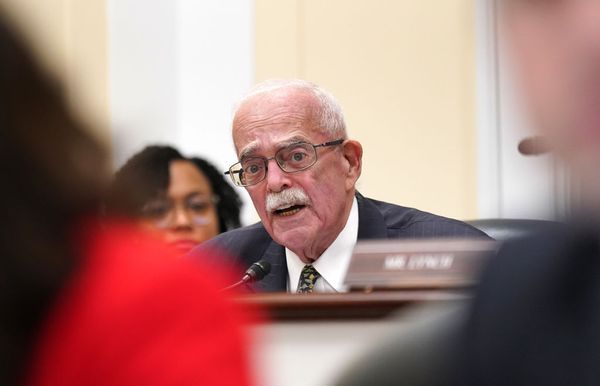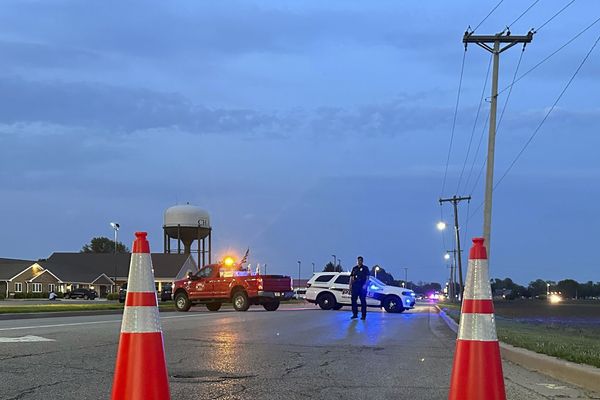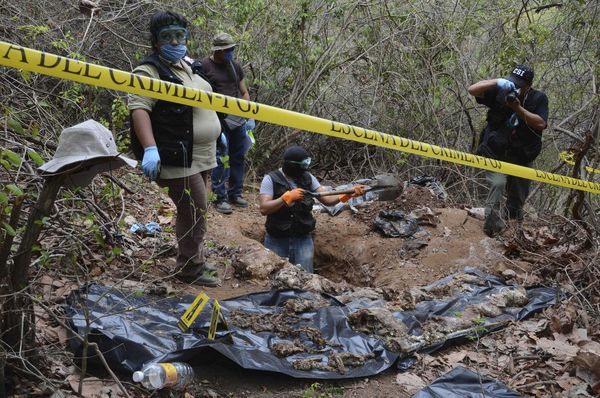
It all began with the bodyguards, and the balled-up pieces of paper. So many pieces of balled-up paper. The bodyguards pressed them into the hands of teenage athletes and aspiring singers and girls on their way home from prom. They kept slipping them into warm, young hands even after their boss, the R&B artist R Kelly, had been indicted for producing child abuse images in 2002, and acquitted in 2008.
On the paper was R Kelly’s phone number. The underage teenage girls would contact Kelly in the hope he would help them in their careers, or because they liked his music, or even just out of youthful curiosity: would he text back? None had any clue of the horror that would unfold. Kelly raped and sexually abused dozens of them. He forced them to live according to degrading restrictions, inflicted physical violence upon them, and even, if reports are to be believed, forced them to eat faeces if they displeased him.
The full scale of Kelly’s depravity is still unfolding: although he was convicted of sexual exploitation of a child, kidnapping and sex trafficking in 2021, Kelly faces a second trial this year for producing child abuse images. It’s estimated that he harmed as many as 48 women and girls in his decades-long campaign of abuse.
In the end it was the notes that helped to convince the investigative journalist Jim DeRogatis of Kelly’s crimes. “When you hear over decades and from different ends of the country,” says DeRogatis, “from women who’ve never spoken to one another, that creepy story of the phone number written on a little piece of paper pressed into the palm of a hand, you think: ‘You couldn’t make up little details like that.’” The Chicago Sun-Times music critic began investigating Kelly in November 2000, after receiving an anonymous fax telling him that: “Robert’s problem – and it’s a thing that goes back many years – is young girls.”
The allegations were not totally surprising: there had long been rumours that Kelly married his protege, the singer Aaliyah, in 1994 when she was 15 and he was 27. (These rumours were subsequently confirmed, although the marriage was swiftly dissolved. Full details of Kelly’s relationship with Aaliyah have never been disclosed: her family and inner circle have remained tight-lipped, and she died in a plane crash in 2001.)

DeRogatis and his colleague Abdon Pallasch began digging into the allegations, and thus began one of the longest-running investigations in journalism, and the most influential. Without their dogged reporting, it’s likely that Kelly would still be abusing young women – and some men – with impunity. But DeRogatis is not triumphalist about finally seeing Kelly behind bars. “Was there satisfaction with the verdict?” he asks. “You know, the women that I’m still in contact with, to a single one, all said: ‘Sure, I’m glad he’s convicted, but it’s too little, too late for me.’ It was very difficult for any of them to take satisfaction out of the fact it took two decades to stop it.”
We are speaking over Zoom ahead of a new documentary, R Kelly: A Faking It Special, which will be released on Discovery+ on 4 May, and the forthcoming paperback of DeRogatis’s memoir, Soulless: The Case Against R Kelly. Soulless is a gripping account that should be required reading for investigative journalists everywhere: what stands out is the level of sheer tenacity required not only to drag Kelly’s crimes into the light, but to make the public care about them. When DeRogatis and Pallasch published their first report into Kelly in December 2000, they assumed the reaction would be so strong that the story would be over, he says. Instead, their investigation – which revealed that Kelly exploited his fame to have sex with a 15-year-old girl – was largely ignored by the national press, and condemned by Chicago’s three biggest Black radio stations, who viewed Pallasch and DeRogatis, both white men, as “trying to tear down a successful Black man”, says DeRogatis.
DeRogatis is effusive about his former colleague the columnist Mary Mitchell, who is Black and remonstrated with her community to take Kelly’s victims, all young Black women, seriously. “She wrote more than two dozen columns in our first two years of reporting,” says DeRogatis, “saying: ‘These are not white men trying to tear down a beloved Black hero. Wake up, Black community. This is a man who is preying on your daughters.’”
Later, Black women would lead the campaign to bring Kelly to justice. Mute R Kelly, the 2017 movement to stop booking Kelly, was founded by Kenyette Barnes and Oronike Odeleye; while dream hampton’s 2019 Lifetime documentary series, Surviving R Kelly, built on DeRogatis’s reporting to bring Kelly’s crimes to an international audience – after its release, federal prosecutors opened an investigation into Kelly that culminated in his criminal conviction. But for the first 15 years of DeRogatis’s reporting, it was an uphill battle to persuade the Black community, the wider music scene, the press and the criminal justice system to believe Kelly’s victims.

“Where was Rolling Stone?” says DeRogatis, almost spitting the words in anger. “Where was the Chicago Tribune? Where were the organisations much bigger and better staffed than the Chicago Sun-Times? And the police? Every system in Chicago, schools, journalism, churches, certainly the judicial system with that travesty of a 2008 trial, everybody failed these young Black girls. And, you know, that is the most frequent comment I heard in two and a half decades of reporting. Nobody cares about young Black girls. Nobody is going to believe us.” DeRogatis and Pallasch shared 33 bylines on Kelly between 2000 and 2008, and most of these stories were met with indifference. During this period, Kelly’s career flourished. What made DeRogatis keep pushing ahead with the story? “I’m from Jersey,” he says. “You know, I’ve got a thick head, I’m stubborn … It’s this thing I have: no matter how shitty the movie, I have to see how it ends.”
DeRogatis is a self-described “fat rock critic” with arms full of tattoos and a raspy laugh. But it’s not hard to see how he won the trust of so many traumatised girls. He has a fatherly air and a warm, self-deprecating humour. Plus, says DeRogatis, “I also spoke music.” (Many of Kelly’s victims aspired to careers in the music industry.) But more than anything, “it was just a willingness to listen,” he says. He never pushed the women to speak to him; most came to him, rather than the other way around. “Nothing you say is going to convince a sexual assault victim to go on the record,” he says firmly. “That has to be her choice.” The only people he ever strong-armed, he says, with a twinkle in his eye, “were fucking lawyers”.
In February 2002, DeRogatis’s phone rang. Go to your mailbox, the caller said. Inside was a tape. He slotted it into his daughter’s video recorder, and saw Kelly raping a 14-year-old girl and then urinating into her mouth. DeRogatis knew who she was, although he had never met her; he had heard rumours the tape existed, but the reality was more appalling than he had ever imagined. “It was 26 minutes and 39 seconds of what is often misreported as grainy video,” says DeRogatis. “But it was crystal clear. So obvious, and horrifying, and disgusting. You know, when you think the average sitcom is half an hour long, to sit through that from beginning to end … Certainly, we thought he was done then. I mean, how do you escape this?”
DeRogatis passed the tape to police, and it formed the basis for Kelly’s 2008 trial, which he describes as “a travesty”. In his view, the judge, Vincent Gaughan, appeared starstruck by Kelly’s celebrity, and moved to exclude relevant information, including Kelly’s past civil settlements with victims, and his marriage to Aaliyah, from the courtroom. After the acquittal, a juror told the press that “if they [the prosecution] had presented it, who knows what we would have done”. The period after the trial was one of “long, sustained pain”, says DeRogatis. “Because I was still hearing from some of these victims – and from new victims.”

DeRogatis believes that, after his acquittal, Kelly grew emboldened. “It amplified to a level of insanity,” he says. Kelly began keeping a cult of brainwashed women, some of them underage, who were starved, beaten and raped. They were made to call Kelly “Daddy”, and thank him when he burped or farted. They dropped out of school and college. Desperate parents involved police, only for police to report that all appeared to be well at Kelly’s mansion. When that failed, they contacted DeRogatis. By now, DeRogatis had left the Chicago Sun-Times, and was a freelance reporter.
He wrote about Kelly’s cult for BuzzFeed News in July 2017, and, finally, his reporting cut through. These were different times – on the brink of #MeToo (the New York Times investigation into Harvey Weinstein was published three months after DeRogatis’s BuzzFeed piece). The cult story went viral. The BBC made a documentary, followed by Surviving R Kelly. The Washington Post reported on the executives who had turned a blind eye. Federal prosecutors opened an investigation.
But, even though his reporting did finally have the impact he had hoped for, DeRogatis is pessimistic about the state of journalism more generally, which has been decimated by a collapse in advertising revenue and print sales. He had struggled to place the cult story, working with three other media organisations only to have it spiked at the last minute due to legal jitters. Today, his primary income comes from teaching (he is an associate professor of English and creative writing at Columbia College Chicago), while Pallasch, his former Chicago Sun-Times colleague, works in communications.
“I’m encouraged by the next generation,” he says, “and eager to cheer them on, but the thing is, you need resources for this kind of reporting. It takes money, and that’s what’s scary, because internet startups and the places that are hiring the students who leave my classes don’t necessarily have those resources.” What advice would DeRogatis give to journalists investigating similar stories? “There’s no such thing as too much evidence,” he says. “Did they tell contemporaries? Are there text messages? Are there photos? Is there video?”
It’s easy to be complacent, says DeRogatis, and think that, post-#MeToo, the public is generally more inclined to believe sexual assault survivors. But look at the 2018 supreme court nomination, when Brett Kavanaugh was confirmed as a supreme court justice, despite Christine Blasey Ford’s claims that he had sexually assaulted her. “Christine Blasey Ford had a doctorate; she was 100% believable … We still don’t believe women.”
“It’s nice that the Pulitzer went to the New York Times and Ronan Farrow for the Weinstein story,” says De Rogatis, “but these stories are not getting easier, and there are many that are still not getting told.”

He has no feeling of closure now that Kelly is in jail. What about those who associated with him? DeRogatis is scathing about executives at Jive Records, which is reported to have made an estimated $1bn from his music; the festivals that booked him, including the indie darlings Pitchfork, even after his first trial for producing child abuse images; and the artists who collaborated with him, including Jay-Z, who toured with Kelly in 2004, and Lady Gaga, who duetted with Kelly in 2013. “Lady Gaga!” DeRogatis explodes. “What are you doing? You’re a champion of the little monsters, right? You’re an inspiring force, a sexual assault victim yourself. A great spokesperson for LGBTQ-plus people. And you make a fucking video with this man! You are far too smart not to have been aware.” Gaga has apologised for collaborating with Kelly; Jay-Z has not.
Even now, Kelly’s music is still popular, with 4.6m monthly Spotify listeners. DeRogatis finds this distasteful. “Can we separate the art and the artist?” he asks. “If you’ve covered popular music at all, much less as long as I have, you know that a lot of horrible people make great art. Ninety-eight per cent of the time, I think we can separate the art and the artists. But there are certain cases where we cannot … I think Kelly is one of them, because the art is about the misdeeds.” Kelly famously titled one album, which he produced for Aaliyah, Age Ain’t Nothing But a Number; in the 1995 track Down Low, he talks about a “silly bitch … screaming ‘rape’”. DeRogatis sees Kelly as someone with a “sociopathic glitch. I don’t use that word lightly. I do not believe he has empathy for anyone. He’s a complete narcissist.”
After Kelly’s conviction, hampton asked DeRogatis whether he felt a void: after all, his reporting on the superstar has been the spine of his career. Not a bit of it, he says. “I’m glad not to have to tell that story any more,” he says. “There’s a certain adrenaline rush that comes with reporting big stories. I don’t think any drug, besides maybe cocaine, burns you out the way that adrenaline does.” Is there any part of the story that still intrigues him? He considers for a moment, then responds: “I’d love to know what happened with Aaliyah … but no one has that story, and I don’t know if anyone ever will.” If anyone can bring that story into the light, I think, it’s DeRogatis.
R Kelly: A Faking It Special is available to stream exclusively on Discovery+







